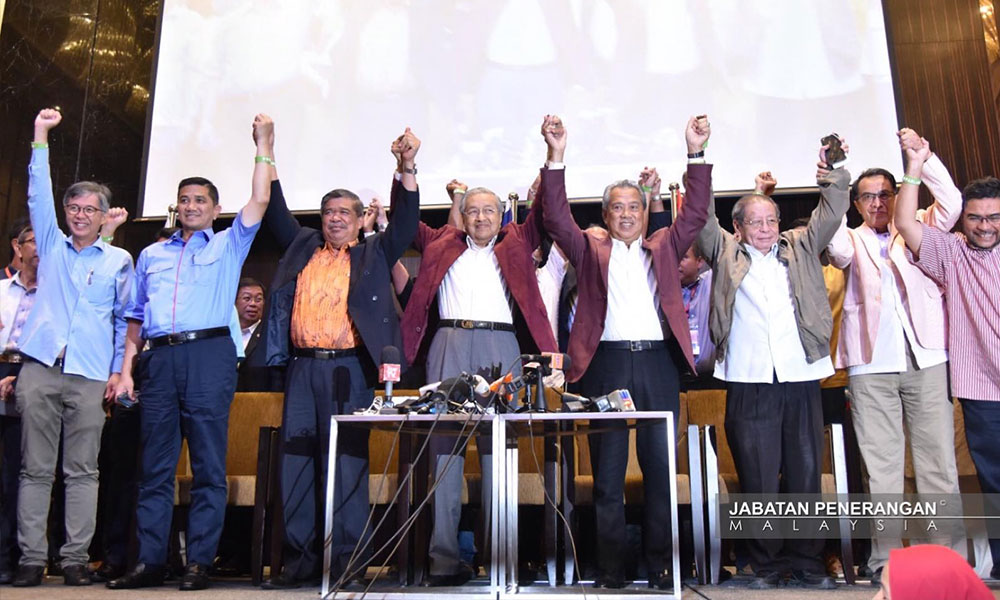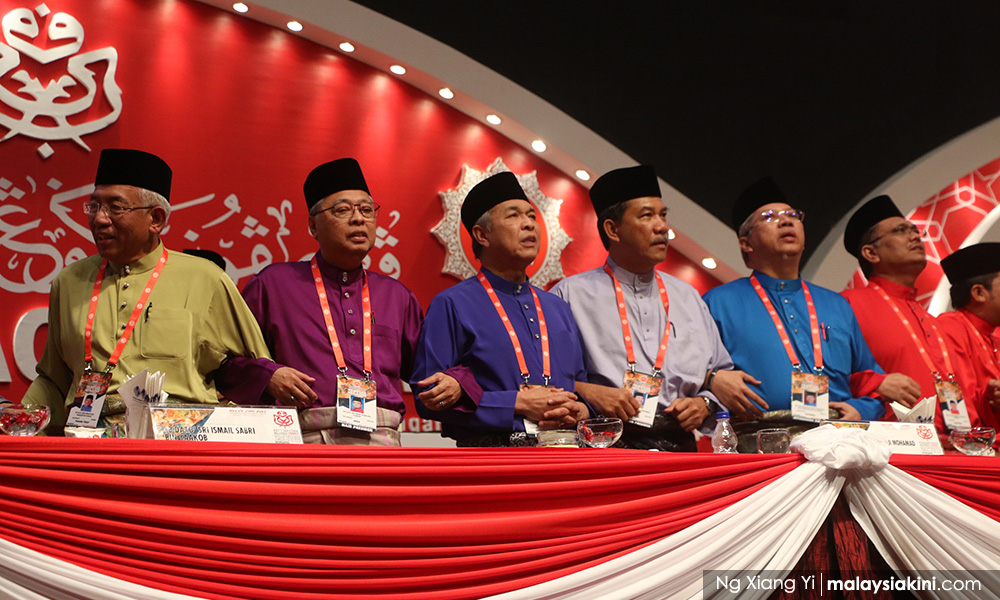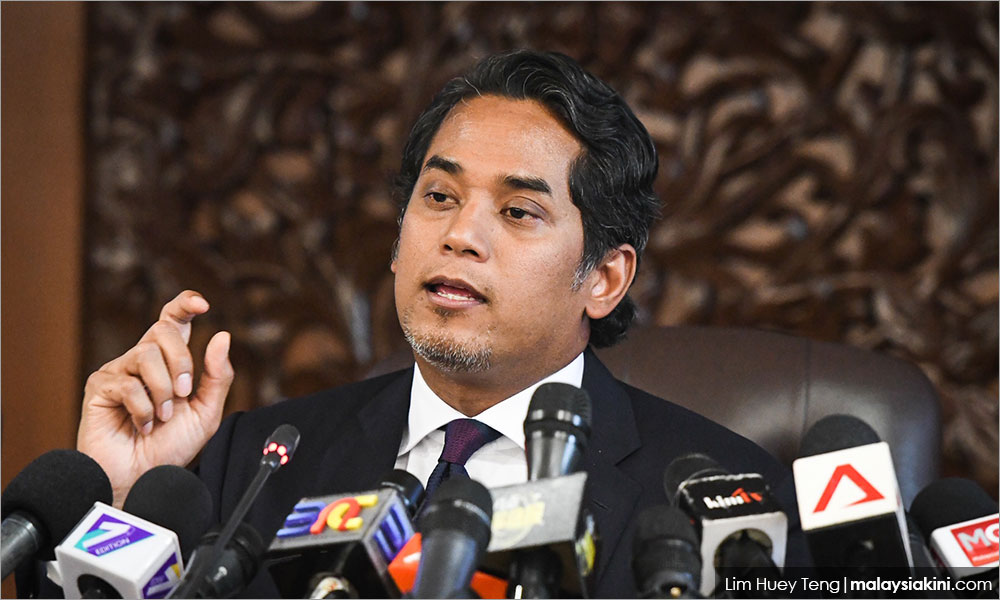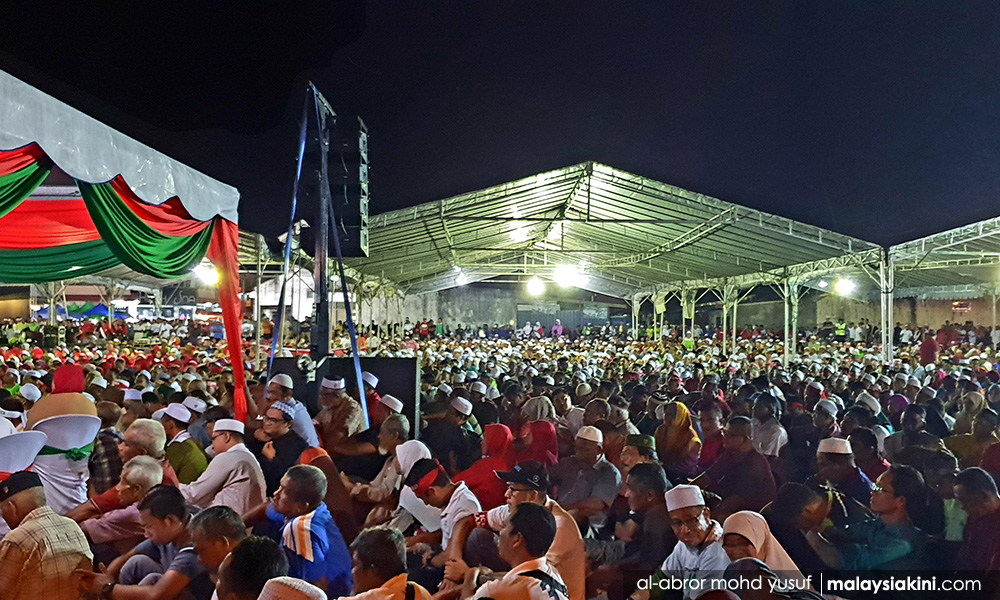
We are likely underestimating how different GE15 will be from GE14. Change comes slowly, and understanding just how much things have changed may take time - which is all the more reason to get started early.
The most important difference between GE14 and GE15 is the role of Umno. Approaching GE14, Umno was still an undefeated behemoth, their fingers on every rein of power in the nation - the biggest bully in the playground.
The near instant disintegration we are seeing in Umno today post-GE14 was not difficult to predict. For decades, the party has been predicated on feudal politics of patronage. It was the job of the underlings to keep the bosses in power, and it was the job of the bosses to feed the underlings.
As long as the bosses controlled the tap of government resources, the well- oiled Umno machine marched merrily on. Without the tap, however, Umno is almost literally nothing. Feudal patronage is not one of many aspects of Umno; feudal patronage is Umno.
There is no way for Umno to turn back into the Leviathan it was in the run-up to GE14. The way things are, there is no way they could privately raise the money they’d need to in order to behave as they once did.
It would be presumptive to say that Umno will not exist at all, but it would not be presumptive to say that if it is a contender in GE15, it will be a very, very different type of contender indeed.
Voting for the incumbent
Defeating Umno in GE 14 required a very particular strategy. There’s no way of determining which factors were eventually the most decisive, but surely the top of the list for Pakatan Harapan included having an alternative Malay-only party, having Malaysia’s and Umno’s most prominent former leader leading the charge, and the years of groundwork done by opposition parties over the last decade or so.
Whichever factors were the biggest, the strategy worked, and we made history. It could be a great disservice to Malaysia however if we formulate our political strategies moving forward as if we had to fight the Umno of GE14 again in GE15, because that is not what we will be up against.

One factor that is not talked about as much is that there is a segment of voters who voted for Umno not just because they were Umno but because they were the incumbent government.
I am not in a position to comment conclusively yet on how exactly big this segment is, but I do believe that there are a significant number of voters (particularly in rural Malaysia) whose position is - “If I vote for the people that control the government, those people can use government resources to make my life better; if I vote for the opposition, I get nothing.”
Of course, this is not something we want to take for granted. A Kancil and a Mercedes run on the same fuel. The other reason people voted Umno was that of ideology. Needless to say, being told by Umno for decades that Malays need a strong party to protect their interests has had some effect.
It is also true that we should not be dismissive of the sentiments of those who still feel this to be the case. All that said, I don’t think we should overestimate the ability of Umno to whip up enough of that sentiment without government backing, or the ability of Umno to translate that into huge numbers of votes.
Doing so requires some next level grassroots organisation. The mechanism and know-how may exist within Umno, but without the constant stream of bribes and cash that used to flow from government coffers, it is like a car with no fuel. Mercedes or Kancil, no petrol means no go.
No fire in Umno fat cats
Long story short, there are nowhere near enough leaders with the stomach or fire within Umno today to make it a formidable opposition force. Doing so would require massive rebranding and a complete overhaul of the party’s culture. All of the existing Umno leaders are too fat, too old, and probably just too lazy for that sort of fight.
The likes of Khairy Jamaluddin (photo) may have some interest in rebuilding a more genuine grassroots organisation; he is one of the few who may have the energy and profile to take on such a task. The thing is, he is no race-obsessed Malay firebrand, unlike the few others still within Umno who might be willing to join him in such an endeavour.

It is clear as day that the majority of Umno simply prefer a short-cut route. Why bother reinventing or re-conceptualising the wheel when they could just switch cars and (in their mind at least) simply continue doing exactly what they’ve done under a different flag.
This is, of course, is where we come to the thorny question of defections.
I will avoid a blanket approach which argues that it is 100 percent good or 100 percent bad. I think, however, a key question to consider is the cost-benefit ratio of accepting defectors, keeping in mind - as mentioned above - the degree to which the political landscape has changed.
The obvious question is: what value do Umno defectors bring to the table?
Would bringing in such leaders gain Harapan votes that it would otherwise not get? Would it bring in votes that are important, decisive votes in key seats? I have not done extensive research, but a superficial analysis does not particularly suggest so.
Prominent Umno leaders - indeed any Umno leader who succeeds in being selected as a candidate - are good at one thing, and one thing only - feudal patronage.
The example of YB 'X'
Let’s take YB “X” (Yang Berhormat, the honorary title for an elected representative) as an example. If YB X decides to stay in Umno, with no access to anything remotely resembling the funds he used to have, how many of his “loyal supporters” will keep supporting him all the way to GE15?
“Very few” is the answer. This is the obvious reason why so many YB Xs want to jump ship and why discourse among opposition politicians now is all about getting federal allocations. Is YB X really so irreplaceable?
I suppose I could think of a very small handful of politicians who fit that mould, and really do have a strong base that supports them no matter which side of the aisle they are on. I say handful here literally, as in you could probably count the number of these people on one hand.
For the vast majority that constitutes the rest though, it seems to me that YB X needs Harapan a lot more than Harapan needs YB X. Even if you wanted to get votes the old-fashioned Umno way (which is obviously not a good thing), you don’t really need YB X. Any old YB Y can do what YB X used to do - it’s not rocket science.
Given that one of the only short-term gains for a Harapan party to accept defecting MPs is to shore up their numbers in Parliament, one must be especially sensitive towards how other Harapan parties react to such moves.
Maintaining the right support
An often quoted statistic is that Harapan won GE14 with only about 25-30 percent of the Malay votes. Different people use this statistic to argue about different things. A common interpretation is that Harapan has a long way to go to increasing Malay support.

I have no objection to increasing Malay support for Harapan, obviously. The only thing to debate is how. My own two sen is that in the short-term, replacing YB X with YB Y, someone who is in a position to work with the government in an ethical way to help his or her constituents will already increase Malay support significantly.
The other important angle of the 25-30 percent statistic that we should not ignore is this - urban Malays and non-Malays carried Harapan to victory.
Let us not be the dog of Aesop’s fable who dropped the bone in his mouth in pursuit of the “bone” he saw reflected in the river. If we alienate the key constituents who brought Harapan to power, the numbers lost there may far outweigh whatever we gain elsewhere.
BN’s racist and divisive model has defined the social fabric of our nation for so long. We have now an incredibly important opportunity to redefine how politics will shape us as a nation.
I think younger Malaysians have no desire to see a BN 2.0 with Bersatu playing the role of Umno and DAP playing the role of MCA and MIC. This is not what we voted for. Internal conflict needs to be managed, and the meta-dynamics of Malaysian politics should be cultivated carefully.
If we do not find the right channels for political energy and competition, Harapan will inevitably turn on itself and start to devour one another. If PKR decides it wants to go it alone, there is already a convenient ideological context for the conflict - they could argue for true multiracialism, versus the BN model of a Harapan led by a Malay only Bersatu.
Some may think this a good thing, but anyone who has had extensive experience with PKR internal politics is aware of the rampant instability this might cause. It’s as if we are back to 1998, with Anwar Ibrahim commanding all the charisma, and Dr Mahathir Mohamed commanding the actual know-how of governance.
We gain a better Malaysia when these elements work in concert, not in discord. Let’s find a way to make this happen, or we will see a truly momentous opportunity tragically slip once again from our fingers.
NATHANIEL TAN wishes everyone Merry Christmas! He has been thinking a lot about a blueprint for a New Malaysia. - Mkini



No comments:
Post a Comment
Note: Only a member of this blog may post a comment.